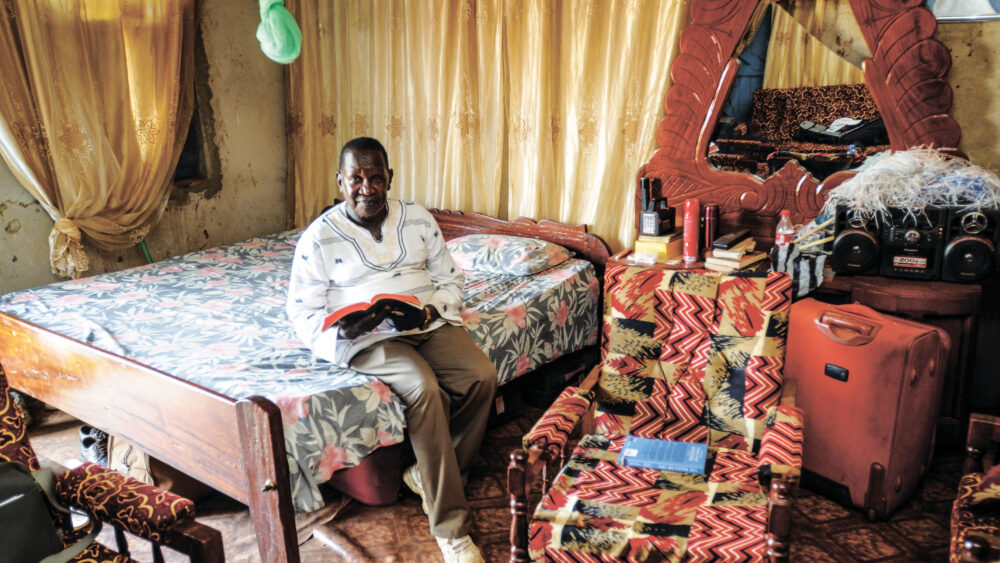Edward Kajivora, the head of Bible Society in South Sudan, lives in a constant state of tension. He describes it as vacillating “between fear and no fear”. It sounds exhausting.
“People on the outside think, ‘how can people live like this?’ But if you came here, you’d see that people are still here. There’s no other option but to live like this. And there is no other hope but to keep living and trusting in God.”
“But you get used to it,” he tells me over a very patchy Skype connection.
“People on the outside think, ‘how can people live like this?’ But if you came here, you’d see that people are still here. There’s no other option but to live like this. And there is no other hope but to keep living and trusting in God.”
Edward lives in South Sudan’s capital, Juba. South Sudan gained independence from its northern neighbour Sudan in 2011 after decades of fighting. But in 2013, civil war broke out in the fledgling country. South Sudan’s new president Salva Kiir accused Vice President Riek Machar of plotting a coup. Between 2013 and 2015, tens of thousands of people were killed and 2.2 million displaced as the government and rebels fought it out on the streets.
When the fighting broke out in 2013, Edward and his family were in Juba.
“There was a lot of fighting that started quickly,” he said. “Of course, we couldn’t sleep in our beds,” he says matter-of-factly. When I asked why, he said, surprised, “You could easily be shot! A bullet could find you by accident … We put our bed mats under the bed frame and we slept there. In the morning, we gave thanks to God.”
Today, there’s a tentative peace agreement in South Sudan. The rebel leader, Vice President Machar, has returned to Juba from exile and was sworn in as the first vice president of a new unity government in April 2016.
But the fighting has taken an enormous toll. Famine is looming as the country faces a critical food shortage. Edward says it’s hard to find food, even in the capital city. Violence in the city is increasing, says Edward. As food becomes increasingly scarce, they do what they must to be able to eat.
“Everyday, when you get up, you thank God. You thank God that you are alive. By day, it’s OK. At night, there is a lot of fear. You can hear shooting. People are being robbed.”
“Trouble brings people closer to God. We want to give people the Scriptures to remind them that, whatever happens, Christ is among them and God is always with them.”
Edward is an ordained minister as well as the leader of the Bible Society. The Bible Society in South Sudan, like the country itself, is still very young. It started in 2012 and has few staff. Its work has been constantly disrupted by war. But, says Edward, it couldn’t be more important to ensure that the people have the Bible and hear it preached. Many church leaders have fled the country. But he will stay.
“Things have settled down a bit this year,” says Edward, reflecting on the ceasefire. “But who knows? Today can be good, and tomorrow can change completely. Now things are calm, but something could be cooking underneath. It can explode at any time.
“My belief is that everything has got an end. This war will have an end. I need to be present so my staff, and the church, will not be afraid. If I run and things subside, when I come back, how will my sheep look at me? So I remain,” he says.
“I preach what God gives to me. I preach reconciliation, love. I preach repentance and forgiveness of each other.”
As peace continues to hold, Bible Society is getting back to work. In Juba, thousands of families have arrived from around South Sudan without anything. They’re living in refugee camps and Edward says many are turning to the Bible.
“In the camp, we come face-to-face with human needs ranging from basic water, food and sanitation. But the real need we encountered was that of inner healing. There is a lot of bitterness.
“Trouble brings people closer to God. We want to give people the Scriptures to remind them that, whatever happens, Christ is among them and God is always with them.”
Edward believes the Bible can change his country. But there are many obstacles to overcome. Not the least of which is that years of civil war has decimated the young country’s education system. Only a quarter of adults in South Sudan can read. And with so many displaced, South Sudan is looking at a new generation of children who will grow up without schooling.
Edward’s vision is to set up literacy classes, run through churches in Juba, for refugees with nothing else to do during the day. He wants people to read the Bible. And he wants to help them learn how to do it.
Bible Society Australia is helping Edward and the new Bible Society in South Sudan in their work to develop literacy classes and distribute Bibles.
Can you help?
Make a Donation
Can you help bring hope and healing to South Sudan? Bible Society Australia’s literacy programme for Shilluk refugees in South Sudan will not only offer them a vital lifelong skill but will ensure they can read their Bibles for themselves.



